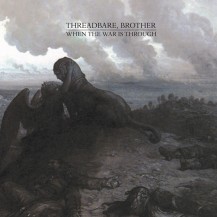Threadbare, Brother’s “When The War Is Through”
“Several tracks are basic meandering numbers that fail to stand out in any particular way sounding overly influenced than displaying Walker’s distinct abilities . . .”
Cameron Barham
4
out of 10
Threadbare Brother
When The War Is Through
September 2011
I am often a wicked and unfair critic on the first couple of listens to a new record which means that I have to keep listening in order to create a bit more balance in reviewing the work. Some of my all-time favorite records had to grow on me over time after I deconstructed them on first listen (Pearl Jam’s “Vs.”, Derek Webb’s “Stockholm Syndrome”, and Bon Iver’s “Self-Titled” come immediately to mind). Thus, I must confess that it took a couple of listens to “When The War Is Through” for me to be able to appreciate the strengths of this subtle and promising first project for Threadbare, Brother.
Timothy Walker is the Atlanta-based creative talent behind the alias Threadbare, Brother. This is his first project apart from his previous work with his sister Anna Kate Walker under the moniker Tim and Kate. He periodically plays Eddie’s Attic and is worth seeing live. If you like Zack Williams, Daniel Clay, Matthew Perryman Jones, or Denison Witmer, then you should give this album a listen.
My rating system for this record will be one point for each song since there are 10 originals. Each song will be broken down into .5 points possible for excellent lyrics and .5 possible for the music. Points may be deducted for particularly bad or out of place tracks. The cover of “Be Thou My Vision” could have earned a possible half point bonus if it was as good as Dave Bazan’s or Andy Hull’s; however, it didn’t stand out and felt too slow for Walker’s vocals.
Overall, Walker has a great voice for the folk-country style of music that he does. It has a soothing yet distinctive quality reminding me of a mellower Zack Williams. The production of the album is well done and gently brings in a variety of musical elements in each song that is very pleasing and worth giving a critical listen. Wilfred Cuthbert’s pedal steel additions are an excellent example of this on “Try to Make You Understand” and “Borrowed Man.” Kate Walker’s and Molly Parden’s backing vocals are simply beautiful and could not have matched Walker’s vocals any better.
The album opens with the strongest track on the record entitled “The Famine Years.” The dynamic of the song is excellent with a mix of heavy floor toms and orchestral arrangement to build the emotion at the appropriate parts only to drop back down to softly plucked minor chords. (1 point)
Walker’s vocals are most beautifully displayed on “Try to Make You Understand,” a lovely country shuffle number and “Goodness,” a song about people struggling to understand the elusive and abstract concept of what is truly good, which includes great musical dynamic when the instrumentation kicks in mid first chorus. (2 points)
The most interesting dialogue on the album comes in “Borrowed Man” as Walker declares over haunting pedal steel and piano:
All the books on my shelf, are foolish and wrong, all the songs I have sung, have gone on far too long; I’m a borrowed man, and I’m building on the sand, Oh the past is a wreck, and the future’s a sea”.
He goes on to question / lament:
And What sort of man am I, What sort of man am I, Oh, what sort of man am I?…Every man he must be something, So what the hell am I? only to answer: I am a borrowed man, with a cross in my hand, Oh, I stand in the door, of the temple of my youth, and I stand in the door, with no words of truth.
Is this a statement of the deconstruction of a worldview or the faith-filled clinging of a wandering, questioning pilgrim? (1 point)
“Down in the Coals” features the angelic backing vocals of Molly Parden accompanied by a tastefully processed banjo. This song suffers from what so many singer-songwriter songs suffer from: it is about a minute or two too long given its lack of dynamic and the lyrics are a bit inaccessible at times falling prey to obtuse metaphors (i.e. “Truth is, a ghost in our window, and we feasted on, the words that she spoke, And in our pain, we have called her lord”). (.5 points)
Several tracks are basic meandering numbers that fail to stand out in any particular way sounding overly influenced than displaying Walker’s distinct abilities including “Dark Mustard Door,” “We’ve Got the Night on Our Face,” “Half-Love,” and the title track, “When The War Is Through.” Unfortunately, they serve to slow the album down and take away from the stronger tracks. (Net of 0 points)
The weakest track is “When Summer Comes Again.” The lyrics are a pantheistic celebration set to a common uninspired musical arrangement that seem significantly out of place in light of the rest of the lyrics and musical tone of the album. (-.5 points)
I look forward to future efforts by Threadbare, Brother as Walker grows and matures musically.
